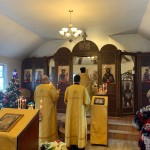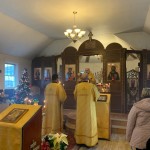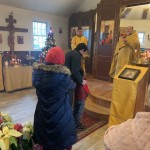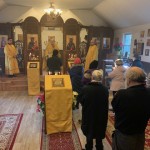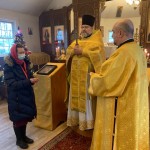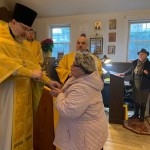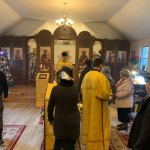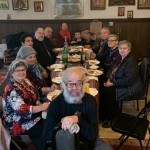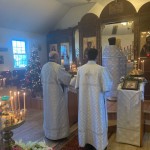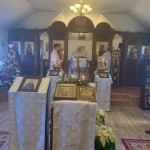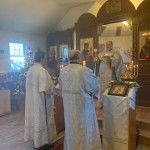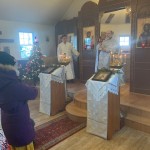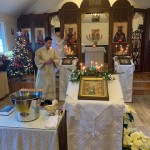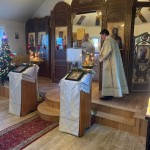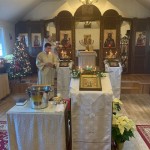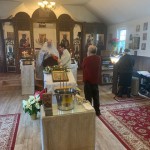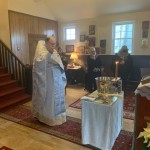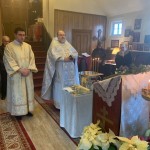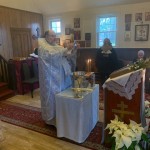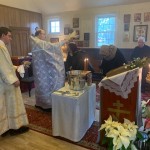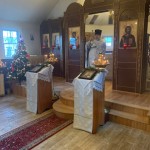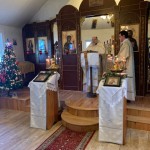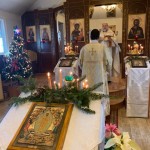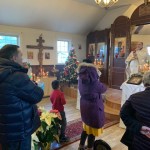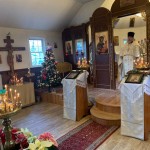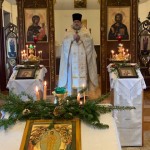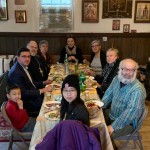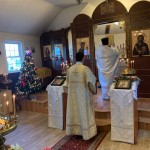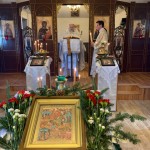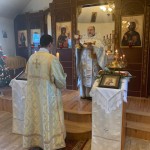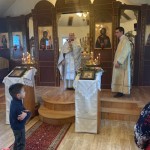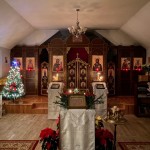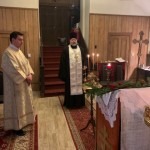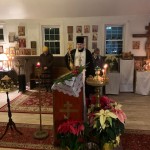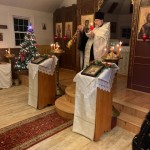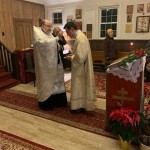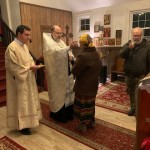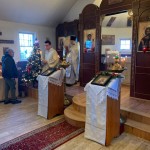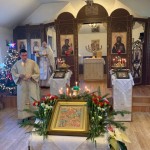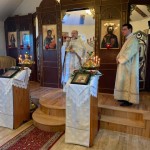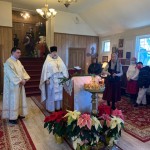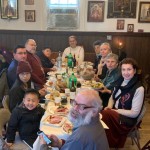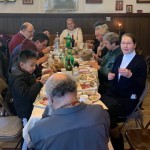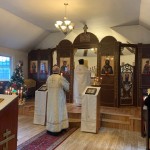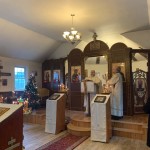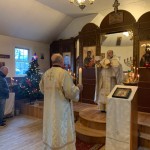On January 31, on the 34th Sunday after Pentecost, Rector of St. George Church, Archpriest Igor Tarasov served the Divine Liturgy in our parish temple. After the reading from the Holy Gospel he preached the following homily:
“Dear brothers and sisters in Christ! Today’s reading from the holy Gospel of Luke repeats the story we had on the 12th Sunday in the Gospel of Matthew. It is about a conversation between our Lord Jesus Christ and a ruler. It deals with a very important question, about everlasting life. The young ruler presented such a question to our Lord Jesus Christ saying: “Good Teacher, what good thing shall I do that I may have eternal life?” (Lk. 18, 18; Mt. 19, 16). The young man did not doubt that eternal life exists, but he wanted to know how to enter into it”.
“That conversation between our Lord Jesus Christ and that man whom the Gospels call either the rich young man or a ruler or a lawyer, reveals that some people are willing to follow the Lord’s advice to renounce their material wealth and some don’t. Yesterday the Church commemorated Venerable Father Anthony the Great. Being a young man, Anthony heard that Gospel reading where Jesus calls the ruler to distribute his wealth and follow the Lord, and decided to do that. He withdrew from the world to the wilderness and became one of the first monks. We can also notice that we don’t know the name of that young man who spoke with Jesus. The Gospel is silent about that. This is because that man went away sorrowful and failed to become the Disciple of Christ. If he did follow the Lord, we would know his name. In the same way we know the names of many Saints, like St. Anthony the Great”.
“Returning to our reflections about the Gospel reading, we may say that answering the ruler’s question, our Lord reminded him of the Commandments. He said that in order to enter into eternal life, one must keep them. He enumerated certain Commandments pertaining to the love of the neighbor. Jesus did it to stress that loving or pleasing God is impossible without loving our neighbors. Holy Apostle John the Theologian said: “He who does not love his brother whom he has seen, how can he love God whom he has not seen?”(1 Jn. 4, 20)”.
“We should also be confronted with that very important question: “What shall we do to have eternal life?” It is known that our life here on earth will end. We will have to leave this world. But our holy faith tells us that after our earthly existence we will enter into everlasting life. Faith also tells us that everlasting life will become eternal blessing and happiness for one and eternal punishment and torment for the others. Therefore, when the young man was asking about “having eternal life”, he wished to know how to acquire everlasting happiness. We should also reflect upon that question”.
“This earthly life is a brief moment in comparison with the eternity that is waiting for us. Therefore, this life has to become our preparation for the life everlasting. Again, Jesus reminds us of the Commandments of God given to the people through Moses. Keeping them we may rightly prepare for the eternity. Let us just concentrate today on one of those Commandments our Lord recalls today: “You shall not murder””.
“People often tend to understand this Commandment in a very narrow sense. “Of course, – they would say, – murdering is a very terrible thing and I would never do it!” But it covers many more things. It also condemns anger, because many people kill or assault others out of anger or quarrel. Warning of that St. Paul teaches: “Do not let the sun go down on your wrath” (Eph. 4, 26). Recently I heard that in Brooklyn a husband killed his wife after an argument. The argument started because the husband wanted to sleep on the certain side of the bed and the wife did not let him because she wanted herself to sleep on that side”.
“Another sin is hatred. It can also cause murder. St. John the Theologian says: “Whoever hates his brother is a murderer, and you know that no murderer has eternal life abiding in him” (1 Jn. 3, 15)”.
“This Commandment also condemns different kinds of self-destruction. People may destroy themselves by drugs, alcohol, tobacco, or by other passions. They may mutilate themselves by tattoos or piercing. All these things are against this Commandment. And finally, working too much, not for living, but for the sake of earning, because of greed, is against our health, thus would be covered by this Commandment. See how broad this Commandment is”.
“Dear brothers and sisters! Keeping the Commandments leads to eternal life. Violating them leads to eternal punishment. The young man said to Jesus that he kept all of them. But, in fact, he was not perfect in doing so. He was attached to his wealth and he left Jesus in sorrow when he heard that he should sell everything and give it to the poor. His riches became his passion that precluded him from acquiring eternal life. But Jesus assured us that with God everything is possible, so a rich man may enter into eternal life if he trusts God and serves Him. Therefore, let us keep the Commandments, let us rightly understand what these Commandments are, and do so with God’s help, acquiring His grace, so we would enter the eternal life”.
During the Litany of Fervent Supplication, the Rector had a petition beseeching the Lord to spare the faithful from the outbreak of the disease.
The choir beautifully performed Psalm 33 and a hymn “O my Gracious Queen” in honor of the Theotokos during preparation for Holy Communion.
Following the dismissal of the Liturgy the Rector greeted Maria Malyshev on her name day celebrated on that Sunday, as well as Tatiana Migal who celebrated her name day last week. Fr. Igor expressed his heartfelt wishes to them, proclaimed the traditional Polychronion and distributed the Theotokian prosphora to those parishioners.
After the Liturgy we enjoyed a delicious luncheon held in honor of our parishioners’ name days. Toasts to Maria and Tatiana were raised at the trapeza table.

